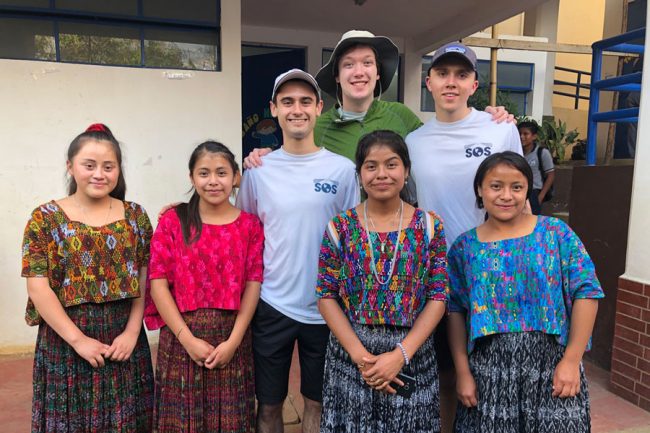
Many buildings in Las Arrugas, Guatemala are supplied with water pipes. The challenge is that most of the time, they are empty.
“Each house only has about three hours of water being supplied to their faucet, every two days,” says Kejdi Kola (Year 4 ChemE). “Families collect as much water as they can to store until the pipes turn on again.”
Even that water isn’t entirely trustworthy. Before using it for drinking, cooking or washing, most families boil the water over a wood fire to ensure that bacteria and other potential pathogens are destroyed.
Kola and his teammates — including Anton Meier (Year 4 ChemE), Calvin Rieder (Year 4 MechE) and Zhenglin Liu (Year 4 MechE) — aim to create a more sustainable solution. They are designing a water filtration system that could decontaminate the water with less energy input, while remaining simple to use, maintain and repair.
The project is part of a fourth-year capstone course at U of T Engineering, and is facilitated by the Centre for Global Engineering. Other project partners include Students Offering Support and Seeds of Innovation for Sustainable Development (SIDS).
“People expect filtration systems to be durable and to provide them with adequate rates of water but if the solution is too expensive or impractical to use, it won’t be feasible,” says Meier. “Addressing the social and cultural differences has been a priority for our team.”
In February 2020, three of the four team members travelled to Las Arrugas to meet with community members and learn more about the design challenge.
“The most memorable aspect of the trip was how welcoming the families of Las Arrugas were,” says Kola. “The time we spent building relationships with the community gave us important insights into how we could improve our design.”
“The community will never forget these amazing future engineers,” says Noe Caal, who lives in Las Arrugas and was the main community contact for the project. “We are grateful for the love and passion they showed, and I hope that they now have a new perspective of developing countries.”
The team decided to site their filtration system at the community school, which serves more than 400 children.
“We have settled on a design to be recommended for the school,” says Kola. “We will also include a user guideline and implementation plan, which includes material procurement and assembly instructions. We’re hoping to have a clear roadmap of all the necessary steps that would have to be taken for the installation of our system.”
Kola says he would highly recommend the experience he’s had for other students.
“It’s a great chance to learn about different cultures and more about yourself,” he says. “Global development capstone projects are an excellent way to bring all of the skills that you learn throughout your degree together to have a significant positive impact on the world.”
– This story was originally published on the University of Toronto’s Faculty of Applied Science and Engineering News Site on April 21, 2020 by Tyler Irving